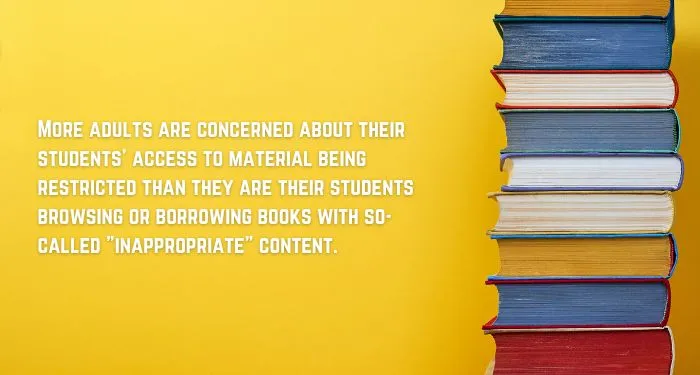
Most Americans Oppose School Book Bans and Restrictions: New Research Supports Freedom to Read
Last fall, EveryLibrary and Book Riot conducted a series of studies to assess parental perceptions of libraries and librarians. The results showed that the vast majority of parents trust librarians and do not think book banning is appropriate. School librarians were deemed as “essential” staff in a school, and parents felt their students were not only safe in school libraries but that the professionals were well-suited to selecting age- and content- appropriate material. School librarians (as well as their peers in public libraries) were ranked among the top five most trustworthy professionals. Now, new research from the Knight Foundation in partnership with Langer Research Associates further supports the fact that most Americans disagree with banning and restricting access to books in school libraries.
Conducted in February and March 2024, the researchers surveyed a nationally-representative pool of 4,000 adults. They spanned political affiliations as well, with 33% identifying as democrat, 27% as republican, and 38% as independent or something else; asked another way, 27% identified as liberal, 41% as moderate, and 29% as conservative. The full methodological and demographic breakdown is here.
Six out of ten Americans feel like they are well-informed about the debate over books in schools, with a similar number stating that it is an issue that is important to them. A little under a quarter of respondents believed they were aware of book restriction issues in their community public schools, with 13% stating that access in their public schools to library material has been restricted. What is positive, though equally distressing, is that fewer than three percent of respondents stated they engaged in book restriction efforts locally. Of that three percent, two were engaged in blocking attempts to restrict access and one percent was engaged in restriction efforts. That suggests, as has been reported previously, it is a tiny number of people instigating the astronomical rise in book bans nationwide.
More adults are concerned about their students’ access to material being restricted than they are their students browsing or borrowing books with so-called “inappropriate” content. They also trust school library workers to select, acquire, and share materials in the school library, with 78% confident in the skills of library professionals.
That’s not to say adults are not concerned nor caught up in the rhetoric around “inappropriate” books in school libraries. Six out of 10 believed that “appropriateness” was a legitimate reason to restrict book access. Of note, though, is that “appropriateness” here does not apply to books that contradict the political, moral, or religious views of the parent. In other words, “appropriateness” here is not about topics like diversity, queerness, social-emotional learning, climate change, and other issues that have been the target of the book banning agenda. Despite the fears about “appropriateness,” only seven percent of parents who had a child of reading age reported their child had borrowed a book they deemed inappropriate. This number parallels that found in the EveryLibrary and Book Riot research. More than nine out of ten children select, borrow, and read books their parents deem appropriate.
It comes as little surprise that the diverging opinions on book restrictions is partisan. Conservatives are more likely to want to restrict access to books, making up 57% of those who think it is appropriate. The conservative population most likely to want to restrict access to books in public schools identified as evangelical, republican, and had students who were not even in public schools. The targeting of public schools is deliberate, coming from the very population seeking to defund these institutions through initiatives like voucher schemes.
Book restrictions are least popular among liberals and democrats, as well as those who identify as LGBTQ+. Over half of the adults who oppose restriction believe that threatens student rights to free expression.
There is little question as to whether or not the right to challenge a book in public schools should exist. It is part of the First Amendment as well–freedom to petition–and nine out of ten adults in this survey agreed. But that agreement comes with caveats. Two-thirds of those adults stated that schools should only take them seriously if there are multiple complaints over the same title. This has, of course, been a tactic commonly employed by groups like Moms For Liberty and No Left Turn in Education, which have created tools such as Book Looks to make it easy to copy/paste complaints in those challenge forms.
More than half of the parents also believe that such challenges create a ripe opportunity for schools to engage in quiet/soft censorship. The chilling effect is a well-known phenomenon among educational gag orders and in an era of book banning, it is easy to simply not purchase items or to allow them to “disappear” and avoid potential challenges. That, of course, comes at the expense of student rights.
The researchers also found, to no surprise, that adults believe teachers and librarians in schools are significantly better positioned to make decisions about materials available to students than state government and community members who don’t themselves have children.
In survey after survey, book banning remains unpopular. Adults trust and believe in the professional capacities of school librarians and educators and parents have rarely experienced a situation where their child has borrowed a book they deem inappropriate. While they support the right to challenge material, they also believe book bans and restrictions are not the solution.
The so called “culture war” over books in school and public libraries is not a culture war. It’s an ideological movement championed by a small group of well-connected, well-funded individuals whose interests are not shared by the vast majority of American adults.
And as this study highlights, most parents know and recognize this, too.
You can read the entire survey on the Knight Foundation website.





